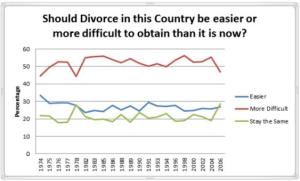There are very few presentations about divorce and single-parenthood at the bi-annual meetings of the Society for Research in Adolescence, but here are the four sessions I found listed on their program.
Thursday, 11:30 am – 12:30 pm (Event 1-024) Poster Session 02 Governor’s Ballroom, Floor 4 Thursday, 11:30 am – 12:30 pm
# 16 Neighborhood Contributions to Positive Parenting and Youth Externalizing Problems in African American Single-Mother Families Jessica Cuellar, Deborah Jones, Stephanie Lane, Rex Forehand, Gene Brody (University of Georgia)
Thursday, 2:45 pm – 3:45 pm (Event 1-058) Poster Session 04 Governor’s Ballroom, Floor 4 Thursday, 2:45 pm – 3:45 pm
Coping with Parental Divorce: A Qualitative Exploration of Young Adults’ Retrospective Accounts Marysia Lazinski, Marion Ehrenberg, Ashley Burbidge (University of Victoria)
Thursday, 4:15 pm – 5:15 pm (Event 1-076) Poster Session 05 Governor’s Ballroom, Floor 4 Thursday, 4:15 pm – 5:15 pm
# 62 Examining correlates of divorce attitudes: Gender, personality, relationship self-efficacy, and exposure to marital conflict Dana Krieg (Kenyon College), Claire Greenfield, LeighAnne White, Emily Hage, Zoe Smith
Friday, 11:30 am – 12:30 pm (Event 2-024) Poster Session 06 Governor’s Ballroom, Floor 4 Friday, 11:30 am – 12:30 pm
# 53 Women like SAHD Ben, but men don’t: Gender differences in emerging adults’ perceptions of family arrangements. Dana Krieg (Kenyon College), Zoe Smith, Claire Greenfield, LeighAnne White, Emily Hage
 Over the past 30 years survey researchers have been traking the US public’s attitudes about obtaining a divorce. From 1974 to 2006 there been very little change in attitudes. Roughly, about 25% of the public thinks it should be easier to obtain a divorce, about 50% think it should be harder and 20% think the law should stay the same.
Over the past 30 years survey researchers have been traking the US public’s attitudes about obtaining a divorce. From 1974 to 2006 there been very little change in attitudes. Roughly, about 25% of the public thinks it should be easier to obtain a divorce, about 50% think it should be harder and 20% think the law should stay the same.